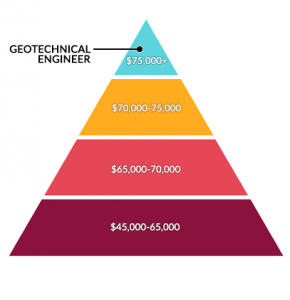Some Of Geotheta
Some Of Geotheta
Blog Article
The Ultimate Guide To Geotheta
Table of ContentsThe Greatest Guide To GeothetaGeotheta - The FactsUnknown Facts About GeothetaThe Only Guide to GeothetaThings about Geotheta

They carry out website examinations, accumulate samples, execute laboratory examinations, and analyze data to review the suitability of the ground for building jobs - Engineer of Record. Based on their findings, geotechnical engineers supply recommendations for foundation design, incline security, retaining frameworks, and reduction of geotechnical threats. They work together with other experts, such as architects, structural engineers, and building groups, to make sure that geotechnical factors to consider are integrated into the total task layout and implementation
By evaluating the habits and homes of soil and rock, they can determine potential geotechnical hazards such as landslides, dirt negotiation, or slope instability. Their knowledge helps avoid failings or accidents that can jeopardize lives and residential property. Right here are some comprehensive obligations and obligations of a geotechnical engineer: Website Examination: Geotechnical designers conduct site investigations to collect information on subsurface conditions.
They interpret the information to comprehend the properties and behavior of the soil and rock, including their toughness, leaks in the structure, compaction qualities, and groundwater problems. Geotechnical Analysis and Design: Geotechnical engineers analyze the data collected during website investigations to evaluate the stability and suitability of the website for building and construction tasks. They execute geotechnical estimations and modeling to review elements such as bearing capacity, settlement, slope stability, side earth pressures, and groundwater circulation.
Geotheta for Dummies
Structure Design: Geotechnical engineers play an important role in making foundations that can securely sustain the desired structure. They examine the soil conditions and tons requirements to determine the appropriate structure type, such as superficial foundations (e.g., grounds), deep foundations (e.g (https://www.storeboard.com/geotheta)., heaps), or specialized strategies like soil improvement. They take into consideration factors such as negotiation limitations, bearing capacity, and soil-structure communication to develop optimum structure layouts
They evaluate building and construction plans, monitor site tasks, and carry out field examinations to confirm that the style recommendations are followed. If unforeseen geotechnical concerns emerge, they examine the situation and offer suggestions for removal or changes to the design. Threat Evaluation and Reduction: Geotechnical designers evaluate geotechnical risks and dangers related to the job website, such as landslides, liquefaction, pop over to these guys or soil erosion.

Collaboration and Communication: Geotechnical designers work very closely with various other professionals entailed in a job, such as engineers, structural engineers, and building and construction groups. Effective interaction and partnership are vital to integrate geotechnical factors to consider right into the general task layout and building process. Geotechnical engineers supply technological knowledge, solution queries, and make sure that geotechnical demands are met.
Geotheta Things To Know Before You Get This
Here are some kinds of geotechnical engineers: Foundation Designer: Structure engineers focus on developing and analyzing foundations for structures. They analyze the soil problems, lots demands, and site characteristics to determine one of the most suitable foundation kind and style, such as superficial foundations, deep foundations, or specialized methods like stack foundations.
They examine the variables influencing incline security, such as dirt properties, groundwater problems, and incline geometry, and create techniques to stop slope failures and reduce risks. Quake Engineer: Quake engineers specialize in evaluating and developing structures to endure seismic forces. They examine the seismic hazard of a site, examine soil liquefaction capacity, and create seismic layout requirements to ensure the security and resilience of frameworks during quakes.
They execute area testing, collect samples, and examine the collected information to characterize the dirt homes, geologic developments, and groundwater problems at a website. Geotechnical Instrumentation Designer: Geotechnical instrumentation engineers concentrate on tracking and measuring the behavior of dirt, rock, and frameworks. They set up and preserve instrumentation systems that check factors such as soil settlement, groundwater degrees, incline motions, and architectural variations to evaluate performance and provide very early cautions of potential issues.
The Best Strategy To Use For Geotheta
They perform tests such as triaxial tests, combination examinations, direct shear tests, and leaks in the structure tests to collect information for geotechnical evaluation and layout. Geosynthetics Engineer: Geosynthetics engineers focus on the style and application of geosynthetic products, such as geotextiles, geogrids, and geomembranes. They make use of these materials to boost soil security, enhance inclines, supply drainage options, and control erosion.
They often tend to be investigative people, which indicates they're intellectual, introspective, and analytical. They are curious, systematic, logical, logical, and logical. Some of them are likewise social, suggesting they're kind, generous, participating, individual, caring, valuable, empathetic, sensible, and friendly - Consulting Engineers.
In the office atmosphere, geotechnical designers use specialized software application devices to carry out computations, develop designs, and analyze data. They prepare reports, review project specs, communicate with clients and staff member, and coordinate job activities. The workplace setup provides a helpful setting for research, evaluation, and cooperation with various other professionals entailed in the project.
An Unbiased View of Geotheta
They regularly check out task websites to perform website investigations, examine geotechnical conditions, and collect information for analysis. These gos to entail taking a trip to various places, occasionally in remote or difficult terrains. Geotechnical engineers might do soil tasting, conduct tests, and monitor construction tasks to make sure that the geotechnical aspects of the job are being implemented appropriately.
Geotechnical designers likewise function in specialized geotechnical laboratories. In these facilities, they conduct experiments, perform examinations on soil and rock samples, and analyze the engineering residential or commercial properties of the products. Geotechnical lab designers work extensively in these environments, handling screening devices, running instruments, and tape-recording information. They work together with various other research laboratory personnel to guarantee exact and reputable testing outcomes.
Report this page